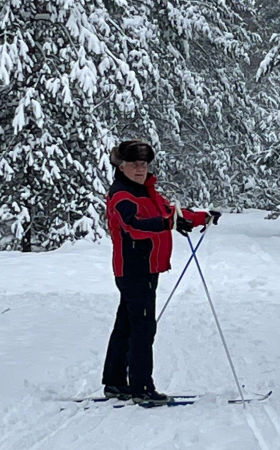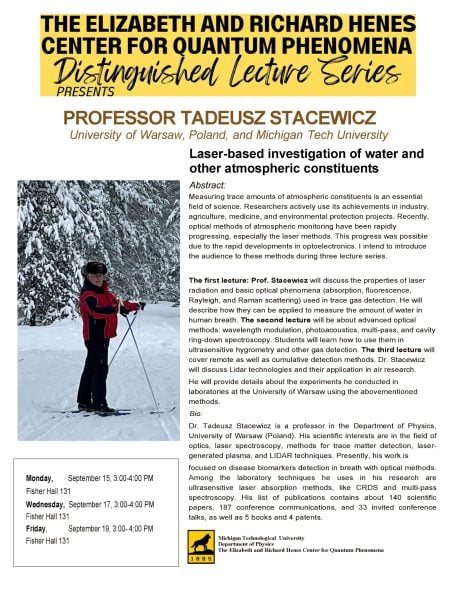The Henes Center for Quantum Phenomena and Department of Physics are proud to host a series of talks by Professor Tadeusz Stacewicz of the Department of Physics, University of Warsaw. These talks are part of the The Elizabeth and Richard Henes Center for Quantum Phenomena Distinguished Lecture Series.
Professor Stacewicz will give three talks on laser-based investigation of water and other atmospheric constituents on Monday, September 15, Wednesday, September 17, and Friday, September 19.
In the first lecture, Prof. Stacewicz will discuss the properties of laser radiation and basic optical phenomena (absorption, fluorescence, Rayleigh, and Raman scattering) used in trace gas detection. He will describe how they can be applied to measure the amount of water in human breath.
The second lecture will be about advanced optical methods: wavelength modulation, photoacoustics, multi-pass, and cavity ring-down spectroscopy. Students will learn how to use them in ultrasensitive hygrometry and other gas detection.
The third lecture will cover remote as well as cumulative detection methods. Dr. Stacewicz will discuss Lidar technologies and their application in air research. He will provide details about the experiments he conducted in laboratories at the University of Warsaw using the abovementioned methods.
Talks will be held in Fisher Hall 131, from 3 – 4:00 pm. Everyone is welcome to these engaging presentations.
About the Physics Department
Physicists at Michigan Technological University help students apply academic concepts to real-world issues. Our physicists take on the big questions to discover how the universe works—from the smallest particles to the largest galaxies. The Physics Department offers three undergraduate degrees and three graduate degrees. Supercharge your physics skills to meet the demands of a technology-driven society at a flagship public research university powered by science, technology, engineering, and math. Graduate with the theoretical knowledge and practical experience needed to solve real-world problems and succeed in academia, research, and tomorrow’s high-tech business landscape.
Questions? Contact us at physics@mtu.edu. Follow us on Facebook, Twitter, and YouTube for the latest happenings. Or read more at the Physics Newsblog.

